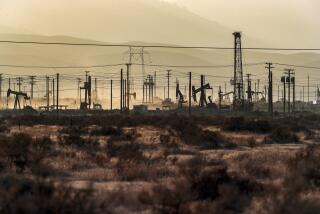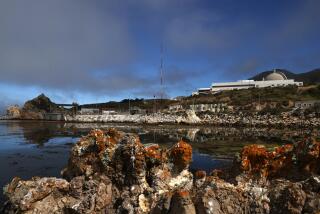Editorial: No, we shouldn’t pump desert groundwater near Joshua Tree to help store electricity
For years developers have tried to figure out how to repurpose Kaiser Steel’s former open-pit iron mine at Eagle Mountain in Riverside County. One idea: Use it as a massive landfill, a proposal that fortunately never came to fruition. The current owners of the site now want to convert it into an immense, $2.5-billion hydroelectric battery, using daytime power to pump water from a lower-elevation pit to a pit 1,400 feet farther up the mountain, then running the water downhill at night through turbines to create energy.
As California sprints to convert to all-renewable energy sources, it is confronting a persistent problem: what to do when the sun goes down and solar farms stop generating electricity, or when the doldrums hit and wind turbines stop churning. These sources produce more electricity than can be consumed immediately, but the grid doesn’t have the storage capacity to save the power for when night falls or the wind stops. And as a result, solar farms have been going offline or producers have been giving away their excess watts.
California already has several pumped-water storage systems, and that approach, while expensive to build, has been relatively reliable. It makes a certain amount of sense in places where water flows naturally, so long as the projects don’t harm the local environment. Still, technology may be making such systems obsolete, as developments in batteries and other storage technologies are preparing a path to cheaper and more efficient systems.
Environmentalists such as the Sierra Club argue convincingly that the diversion would pose a mortal threat to desert life in the park.
Nevertheless, the state Legislature is considering a measure (Senate Bill 772) by Sen. Steven Bradford (D-Gardena) that would require the California Independent System Operator, which oversees most of the state’s power grid, to begin buying at least 2,000 megawatts of power from “one or more long duration energy storage projects” in the next three years. The costs would be passed along to ratepayers covered by the grid.
No projects are specified, but about the only one that would meet the criteria is the proposed Eagle Mountain Pumped Storage Project. This bill would essentially lock in a power source for the grid that market forces might disfavor, leaving consumers to foot the bill. At the same time, it would guarantee revenues for a project that may not make sense financially. According to the Senate’s own analysis, “considering the cost to ratepayers is likely in the billions of dollars for projects and corresponding transmission lines mandated by this bill, it would seem wise to proceed with caution.”
We suggest an even stronger line: Don’t pass this bill. And not just because the necessity of this particular project is in doubt, but because the potential environmental impact is far too severe to let it go through.
Enter the Fray: First takes on the news of the minute »
The plan calls for pumping 8 billion gallons of water in the first few years, and more than 30 billion gallons over 50 years, from the aquifer adjacent to, and connected with, the one beneath neighboring Joshua Tree National Park. Environmental groups such as the Sierra Club argue convincingly that the diversion would pose a mortal threat to desert life in the park at a time when global warming is already stressing out the habitat.
The proposed site, which Congress carved out of the then-Joshua Tree National Monument in 1950 to allow iron ore mining, has become a home for bighorn sheep, golden eagles and desert tortoises, among other species. Environmentalists argue that filling the basins with water — creating manmade lakes — would significantly alter the desert habitat. A better use for the land, which ceased to be mined more than 30 years ago, would be to return it to the fold and make it part of Joshua Tree National Park.
There is no issue of higher importance facing the nation today than climate change, which results from the global warming caused by our reliance on fossil fuels for energy. It is existentially important for the nation — the world — to get away from fossil fuels as quickly as we can to have any hope of mitigating the worst effects of an environmental catastrophe of our own making. But boosting lawmakers’ pet projects, especially those that may not aid us in our increasingly desperate fight against global warming, is a poor way to go about it. SB 772 faces a vote this week in the Senate before it can go on to the Assembly. If the Legislature has the bad judgment to pass it, then Gov. Gavin Newsom should veto it.
Follow the Opinion section on Twitter @latimesopinion or Facebook
UPDATES:
2:23 a.m.: This editorial was updated to clarify the location of the aquifer to be tapped.
More to Read
A cure for the common opinion
Get thought-provoking perspectives with our weekly newsletter.
You may occasionally receive promotional content from the Los Angeles Times.










